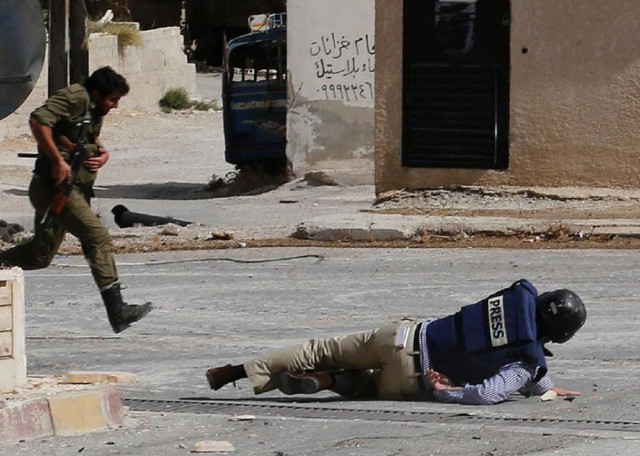110 journalists killed in 2015, mostly in 'peaceful' countries: RSF
India saw five journalists killed in the course of their work and four for uncertain reasons

War-torn Iraq and Syria were the most dangerous places in the world this year for journalists, with 11 and 10 fatalities respectively. PHOTO: AFP
Sixty-seven journalists were killed in the line of duty, the watchdog group said in its annual roundup, listing war-torn Iraq and Syria as most dangerous places for journalists with 11 and 10 fatalities respectively, followed by France, where eight journalists were killed in a militant assault on a satirical magazine.
At least 12 killed in Paris massacre
A further 43 journalists around the world died in circumstances that were unclear and 27 non-professional "citizen-journalists" and seven other media workers were also killed, RSF said.
The high toll is "largely attributable to deliberate violence against journalists" and demonstrates the failure of initiatives to protect media personnel, the report said, calling for the United Nations to take action.
The report spoke of the growing role of "non-state groups" -- often militants such as the Islamic State group -- in perpetrating atrocities against journalists.
In 2014, it said, two-thirds of the journalists killed were in war zones. But in 2015, it was the exact opposite, with "two-thirds killed in countries 'at peace'."
"Non-state groups perpetrate targeted atrocities while too many governments do not comply with their obligations under international law," RSF Secretary General Christophe Deloire said.
IS claims it has beheaded Japanese journalist Kenji Goto
"The 110 journalists killed this year need a response that matches the emergency. A special representative of the United Nations secretary-general for the safety of journalists must be appointed without delay."
The 67 deaths bring to 787 the total number of journalists who were murdered, knowingly targeted or killed in the course of their work since 2005, the Paris-based organisation said. In 2014, there were 66 such fatalities.
France was the scene of an unprecedented attack on the press in January, when gunmen opened fire at the offices of the satirical magazine Charlie Hebdo, killing 12 people, including eight journalists.
 A demonstrator holds a placard reading "Je Suis Charlie" (I am Charlie) -- a slogan that has come to symbolise the fight for freedom of expression after jihadist gunmen stormed the Paris offices of satirical magazine Charlie Hebdo. PHOTO: AFP
A demonstrator holds a placard reading "Je Suis Charlie" (I am Charlie) -- a slogan that has come to symbolise the fight for freedom of expression after jihadist gunmen stormed the Paris offices of satirical magazine Charlie Hebdo. PHOTO: AFP"A western country had never suffered a massacre of this kind in the past," RSF said.
"Charlie Hebdo's journalists and employees have been living under close protection ever since. Some of them still have to keep changing their place of residence."
In Syria, the northern town of Aleppo was described as "a minefield" for professional and citizen-journalists alike.
"Caught between the various parties to the conflict since 2011, journalists are liable to end up as collateral victims, being taken hostage by a non-state group (such as Islamic State, the Al Nusra Front or the Free Syrian Army) or being arrested by the Assad regime," RSF said.
 A picture taken on April 30, 2014 shows Japanese journalist Kenji Goto leading a training seminar for Syrian journalists in the northern Syrian city of Aleppo. PHOTO: AFP
A picture taken on April 30, 2014 shows Japanese journalist Kenji Goto leading a training seminar for Syrian journalists in the northern Syrian city of Aleppo. PHOTO: AFPThose murdered in Syria included Japanese freelance reporter Kenji Goto, whose execution by the Islamic State group was unveiled in a macabre video in January.
A separate report by the New York-based Committee to Protect Journalists said 69 journalists were killed for their work in 2015, with 40 per cent at the hands of Islamic militant groups such as Al-Qaeda or the Islamic State group.
Fourth secular blogger hacked to death in Bangladesh
The CPJ said it is investigating the deaths of at least 26 others to determine whether they were work-related.
"Unlike in the past three years, the deaths were widely distributed across countries," the CPJ report said. "At least five journalists were killed in each Iraq, Brazil, Bangladesh, South Sudan, and Yemen."
The RSF report also singled out India, where nine journalists had been murdered since the start of 2015, some of them for reporting on organised crime and its links with politicians and others for covering illegal mining.
Senior journalist Aftab Alam shot dead in Karachi
India saw five journalists killed in the course of their work and four for uncertain reasons, which is why it ranked below France where the cause of death was known.
"Their deaths confirm India's position as Asia's deadliest country for media personnel, ahead of both Pakistan and Afghanistan," RSF said, urging the Indian government to establish "a national plan for protecting journalists".
In Bangladesh, four secularist bloggers were killed in acts claimed by local militants.
"The passivity of the Bangladeshi authorities in the face of this bloodbath has fostered a climate of impunity that is extremely dangerous for citizen journalists," RSF said.



















COMMENTS
Comments are moderated and generally will be posted if they are on-topic and not abusive.
For more information, please see our Comments FAQ